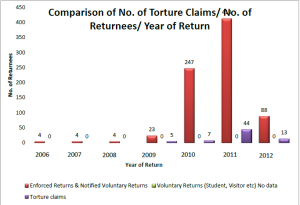- BY Shivani Jegarajah

What is the magic number?
THANKS FOR READING
Older content is locked

A great deal of time and effort goes into producing the information on Free Movement, become a member of Free Movement to get unlimited access to all articles, and much, much more
TAKE FREE MOVEMENT FURTHER
By becoming a member of Free Movement, you not only support the hard-work that goes into maintaining the website, but get access to premium features;
- Single login for personal use
- FREE downloads of Free Movement ebooks
- Access to all Free Movement blog content
- Access to all our online training materials
- Access to our busy forums
- Downloadable CPD certificates
How many torture claims from returnees to Sri Lanka are necessary before the UKBA and the Courts decide that the time has come for review?
 This graph (click link to see further details) attempts to collate the data from recent reports and compare it against a broad pattern of removals and shows a correspondence between increased returns in 2011 and increased torture claims documented by credible and reputable organisations. Since the last country guidance was promulgated there have been 69 claims of torture in respect of those who were returned or chose to return to Sri Lanka. 69 is a high figure and so surely the time has come to take stock. Just as the world watched when genocide was taking place in May 2009 and 20,000 Tamils were killed in only a few months, the Tamil community is witnessing a singular lack of interest in mounting torture claims in respect of those who have been found to have no profile or those who had no fear in returning.
This graph (click link to see further details) attempts to collate the data from recent reports and compare it against a broad pattern of removals and shows a correspondence between increased returns in 2011 and increased torture claims documented by credible and reputable organisations. Since the last country guidance was promulgated there have been 69 claims of torture in respect of those who were returned or chose to return to Sri Lanka. 69 is a high figure and so surely the time has come to take stock. Just as the world watched when genocide was taking place in May 2009 and 20,000 Tamils were killed in only a few months, the Tamil community is witnessing a singular lack of interest in mounting torture claims in respect of those who have been found to have no profile or those who had no fear in returning.
The Treasury solicitors have already begun making unsolicited representations directly to the Administrative Court in an attempt to pre-empt judicial reviews challenging removal in the light of a new report from FfT. But in fact a report released yesterday from Human Rights Watch was first submitted to the UKBA on the 1st August 2012 and notwithstanding that the UKBA are going ahead with large scale removals.
It is not known whether any other UKBA briefings have been sent to the Administrative Court ahead of the flights, but no doubt all documentation will be disclosed to ILPA in the interests of transparency and fairness.
The last country guidance case was promulgated on the 11th December 2009. 33 months later there have been significant events in Tamil diaspora activism or relevant to it: the protest against Rajapakse’s visit to the UK at Heathrow on 29th November 2010, the protest outside the Sri Lankan High Commission on Independence day on 8th February 2011, the airing of Channel 4’s “The Killing Fields” on 14th June 2011, the UN Panel of Expert’s report on Sri Lanka – 31st March 2011 [the UN found claims of war crimes including genocide to be credible], the UN Human Rights Council backed a Resolution in favour of urging Sri Lanka to investigate war crimes on the 22nd March 2012 and the protests on the 6th and 7th June 2012 against Rajapakse’s visit to the UK for the Jubilee celebrations.
The focus of State interest has shifted to diaspora Tamils.
On the 12th January 2012, the Defence Secretary, Gotabhaya Rajapaksa for Sri Lanka observed that:
The LTTE, although defeated in the country, is still active overseas and groups sympathetic to the LTTE cause are attempting to revitalize their movement at international level. Though many LTTE-friendly groups and individuals function overseas separately, they have one common objective of dismembering Sri Lanka and establishing a separate State.
There is at least a prima facie case to be made of significant risk to returnees for the following reasons:
a. Government hostility towards people that have been part of the diaspora even if for a short time
b. Government hostility towards asylum seekers as these are considered to tarnish the country’s image
c. A government policy of intimidation of critics including presumed critics who have spent periods abroad in diaspora centres of political activity
d. An atmosphere of impunity towards Tamils and in particular, vulnerable groups such as failed asylum seekers who may then be targets for disappearance and white van abductions
e. The systematic use of torture, disappearances and other forms of abuse against vulnerable groups including Tamil asylum seekers, critics, and those who have been previously detained and tortured.
